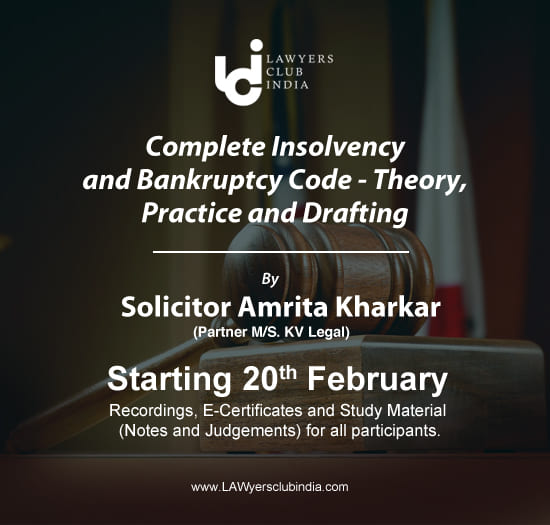Savan Godiawala v. Apalla Siva Kumar - Right of the Adjudicating Authority in deciding the payment of gratuity.
- Bench: Justice V. P. Singh, Venugopal M
- Appellant: Savan Godiawala, The liquidator of Lanco Infratech Limited
- Respondent: Apalla Siva Kumar
- Citation: Company Appeal (AT) (Insolvency) No. 1229 of 2019
Issues
Was the Adjudicating Authority legally right in issuing directions to the liquidator to make provisions of payment towards gratuity?
Click here to enroll masterclass on - The IBC - Theory, and Practice by Adv. Amrita Kharkar
Facts
- An interim application was filed by the ex-employees of the Corporate Debtor seeking direction to the Liquidator, to treat Gratuity dues of the applicants on the highest priority, by not treating it as part of the Estate of the Corporate Debtor.
- This Appeal emanates from the Order passed by the Adjudicating Authority/National Company Law Tribunal, Hyderabad Bench, Hyderabad in I.A. No. 96 of 2019 in connection with C.P. (IB) No.111/7/HDB/2017, whereby the Adjudicating Authority had directed the Liquidator to pay the Gratuity to the employees, and further observed that the Liquidator could not avoid the liability to pay Gratuity to the employees on the ground that the Corporate Debtor didn't have separate funds for payment of gratuity.
- The Adjudicating Authority directed to pay gratuity stating that the amount had been proposed in the CIRP costs towards dues payable to employees, which have been accrued and have become due during the CIRP period, was uploaded by the Resolution Professional on the website of the Corporate Debtor.
- An order for liquidation was passed and thereby claims were submitted by the applicants as prescribed in Form E of the Insolvency and Bankruptcy Board of India (Liquidation Process) Regulations, 2016.
Appellant's Contentions
- The Liquidator contended that the gratuity fund of the employees had not been treated as part of the Liquidation Estate. Since the Corporate Debtor never maintained a separate fund for payment of gratuity to its employees, thus it can not be paid from the running accounts of the Corporate Debtor, as and when the same became due.
- It was said that out of 66 employees who filed the application, most had left the organisation much before the commencement of insolvency process and that only 14 employees worked with the Corporate Debtor after the commencement of CIRP. The employee's dues, therefore, before the commencement of CIRP was in no event be able to term as insolvency resolution process cost.
Respondent's Contentions
- The respondent contended that the Corporate Debtor had failed to maintain a Gratuity fund or obtain insurance for the fulfilment of its liability towards payment of the gratuity to its employees, under the Payment of Gratuity Act, 1972.
- It was mentioned that section 4(1) of the Payment of Gratuity Act, 1972 mandates payment of gratuity by the employer to an employee in consideration of his continuous service for the employer. In the absence of the creation of gratuity fund by the Corporate Debtor, the gratuity dues payable to the employee shall be treated as an asset of the employee lying in possession of Corporate Debtor and as such, cannot be treated as a claim at par with other creditors.
- The applicant also contends that payment of gratuity to the employees holds as a mark of reward in return for their service of more than 5 years and also that section 36(4)(a)(iii) of the Code had excluded the gratuity dues of the employees from the liquidation estate assets, treating it as an asset of the employees, lying with the Corporate Debtor. Therefore, the waterfall mechanism as prescribed under Section 53 of the Code, would not apply to the payment of gratuity dues, and payment of the same should have been paid in priority to any payment made under the waterfall mechanism.
Judgement
The Appellant Tribunal held that the Adjudicating Authority had erred in directing the Liquidator to make provision for payment of gratuity.
Relevant Paragraphs
"Based on the judgment of this Appellate Tribunal in case of the State Bank of India Vs. Moser Baer Karamchari Union and Another, 2019 SCC Online NCLAT 447, it is clear that in terms of sub-Section (4)(a)(iii) of Section 36 all sums due to any workman or employees from the Provident Fund, Pension Fund and the Gratuity Fund, do not form part of the liquidation estate/liquidation assets of the ‗Corporate Debtor'. Therefore, the question of distribution of Provident Fund or the Pension Fund or the Gratuity Fund in order to prioritize, and within such period as prescribed under Section 53(1), does not arise. It is further held in the above case that 53(1)(b)(i) of the I&B Code, regarding the distribution of assets, relating to workmen's dues is confined to a period of 24 months, preceding the liquidation commencement date. This question has already been decided that the Gratuity Fund does not form the part of the liquidation asset. Therefore, the question of distribution of the Gratuity Fund in order of priority, provided under Section 53(1) of the Code does not arise. However, the Adjudicating Authority has given direction to the Liquidator that, ―the Liquidator cannot avoid the liability to pay Gratuity to the employees, on the ground, that ‗Corporate Debtor' did not maintain separate funds, even if, there is no fund maintained, the Liquidator has to provide sufficient provision for payment of Gratuity to the Applicants according to their eligibility."
To read more, Click here
Join LAWyersClubIndia's network for daily News Updates, Judgment Summaries, Articles, Forum Threads, Online Law Courses, and MUCH MORE!!"
Tags :students










